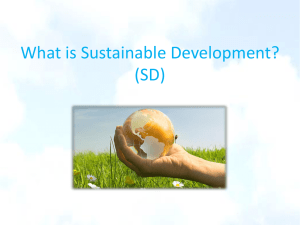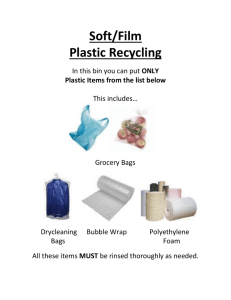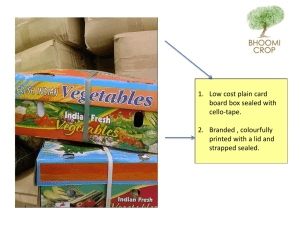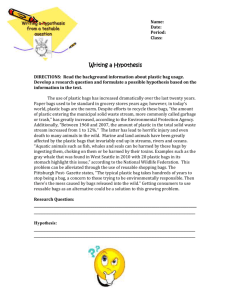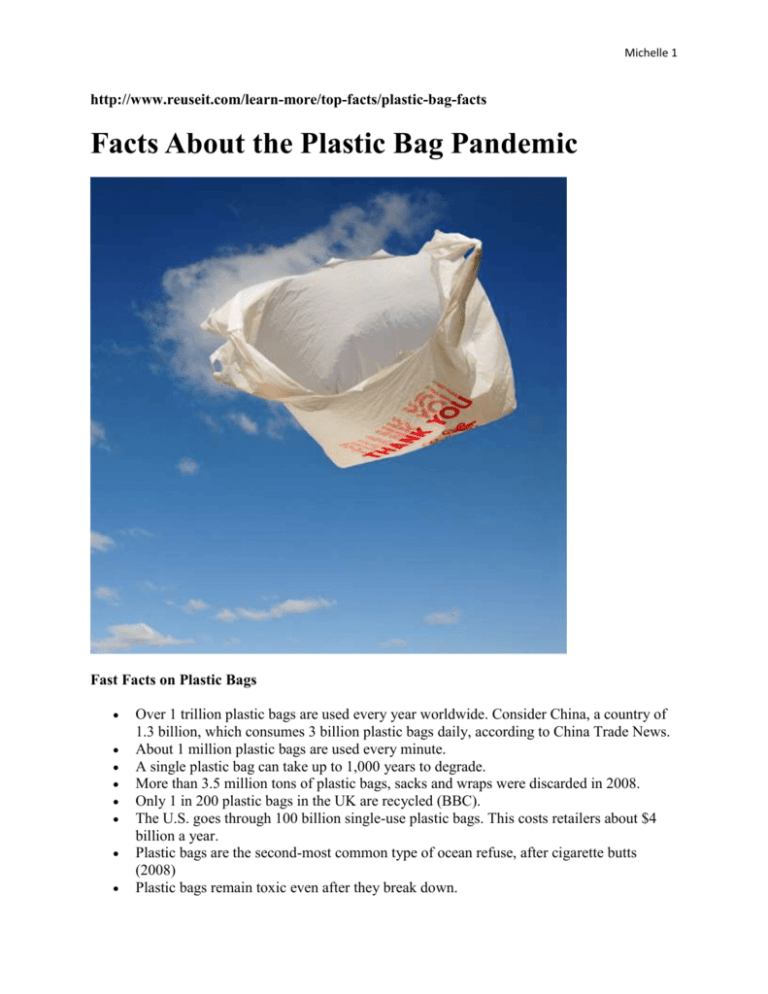
Michelle 1
http://www.reuseit.com/learn-more/top-facts/plastic-bag-facts
Facts About the Plastic Bag Pandemic
Fast Facts on Plastic Bags
Over 1 trillion plastic bags are used every year worldwide. Consider China, a country of
1.3 billion, which consumes 3 billion plastic bags daily, according to China Trade News.
About 1 million plastic bags are used every minute.
A single plastic bag can take up to 1,000 years to degrade.
More than 3.5 million tons of plastic bags, sacks and wraps were discarded in 2008.
Only 1 in 200 plastic bags in the UK are recycled (BBC).
The U.S. goes through 100 billion single-use plastic bags. This costs retailers about $4
billion a year.
Plastic bags are the second-most common type of ocean refuse, after cigarette butts
(2008)
Plastic bags remain toxic even after they break down.
Michelle 2
Every square mile of ocean has about 46,000 pieces of plastic floating in it.
The Problem
An estimated 6 billion plastic bags are consumed--just in that county--each year.
(William T. Fujioka, 2008)
It is estimated that worldwide plastic bag consumption falls between 500 billion and 1
trillion bags annually. That breaks down to almost 1 million every minute.
The average family accumulates 60 plastic bags in only four trips to the grocery store.
In good circumstances, high-density polyethylene will take more than 20 years to degrade.
In less ideal circumstances (land fills or as general refuse), a bag will take more than
1,000 years to degrade.
An estimated 3,960,000 tons of plastic bags, sack and wraps were produced in 2008. Of
those, 3,570,000 tons (90%) were discarded. This is almost triple the amount discarded
the first year plastic bag numbers were tracked (1,230,000 tons in 1980). (EPA)
Anywhere from .5% to 3% of all bags winds up recycled. (BBC, CNN)
Every square mile of the ocean has about 46,000 pieces of floating plastic in it. (UN,
2006)
Ten percent of the plastic produced every year worldwide winds up in the ocean. 70% of
which finds its way to the ocean floor, where it will likely never degrade. (UN, 2006)
The Impact
The U.S. goes through 100 billion plastic shopping bags annually at an estimated cost to
retailers of $4 billion. (The Wall Street Journal)
The extremely slow decomposition rate of plastic bags leaves them to drift on the ocean
for untold years. According to Algalita Marine Research Foundation, these plastic bags
cause the death of many marine animals (fish, sea turtles, etc.), every year when animals
mistake them for food.
Numbers were kept on 43 different types of refuse. Cigarette butts were the most
common. Plastic bags came in second. (Ocean Conservency, 2008)
When plastics break down, they don't biodegrade; they photodegrade. This means the
materials break down to smaller fragments which readily soak up toxins. They then
contaminate soil, waterways, and animals upon digestion.
Windblown plastic bags are so prevalent in Africa that a cottage industry has sprung up
to harvest them. These are then woven and sold as hats and (more durable) bags.
The Solution
The solution is not a plastic bag ban, which is an emotional response which fails to strike
at the heart of the issue; instead of a market-based solution, a ban shifts production to
paper bags and compostable bags, both of which have heavy environmental consequences.
The solution is not switching to paper bags or compostable plastic bags. A study on the
life cycle of three types of disposable bags (single-use plastic, paper, and compostable
plastic) showed that both compostable plastic and paper bags require more material per
bag in the manufacturing process. This means "higher consumption of raw materials in
Michelle 3
the manufacture of the bags...[and] greater energy in bag manufacturing and greater fuel
use in the transport of the finished product. ...The added requirements of manufacturing
energy and transport for the compostable and paper bag systems far exceed the raw
material use in the standard plastic bag system." (from a peer reviewed Boustead
Consulting & Associates report)
reuseit.com™ supports a multi-pronged approach that discourages the distribution of
plastic bags with a tax and a cultural shift away from use-and-toss plastic bags:
o Plastic Tax: In 2001, Ireland implemented a plastic tax (or PlasTax); the first of
its kind, this route acknowledges the fact that people will still occasionally use
plastic bags. This market-based solution discourages daily, thoughtless use of
plastic bags by charging a nominal fee per bag at checkout. In a study by the Irish
Department of the Environment it was found that plastic bag usage had dropped
93.5%. This breaks down to a drop from 328 to 21 bags per person each year.
o A cultural shift away from use-and-toss culture: Each reusable bag can
eliminate hundreds (if not thousands) of plastic bags.
© 2003-2012, reuseit.com. All rights reserved.
.
http://www.theolympian.com/2011/09/18/1804375/plastic-bags-a-serious-threat.html
Plastic bags a serious threat to wildlife
ROBB KREHBIEL; Seattle • Published September 18, 2011
36 Comments
In late August, orcas were spotted at Boston Harbor. Now in early September, the chances of
seeing these amazing creatures in the South Sound are getting better and better.
Sadly, these amazing whales are threatened by one of the most ubiquitous shopping items:
plastic bags.
Plastic bags are a serious threat to orcas, salmon, seals, and other wildlife because they can
ingest them, choke on them, or be harmed by toxins.
In Washington, this problem was highlighted last year when a grey whale was found dead with
20 plastic bags in its stomach.
Michelle 4
Olympia uses over 16 million plastic bags every year, so we can make a huge difference for
Puget Sound and its wildlife by banning them. We don’t need disposable, plastic bags when
there are so many reusable alternatives available, and too many of them end up as litter, making
their way from our streets to the beach and then into Puget Sound.
Nothing we use for 5 minutes should pollute the Sound for 500 years.
In Washington, Bellingham and Edmonds have already banned these bags, protecting the Sound.
As the capital city, Olympia should be a leader in the effort to protect Puget Sound wildlife.
Read more here: http://www.theolympian.com/2011/09/18/1804375/plastic-bags-a-seriousthreat.html#storylink=cpy
http://www.simply4paws.com/index.php?option=com_content&view=article&id=5:the-reality-of-plasticbags&catid=10:articles&Itemid=5
The reality of plastic bags
Latest research has revealed that plastic bags actually take a lot longer than previously thought to break
down. Ongoing research and tests are able to calculate this effect and now estimate that plastic bags
begin the process of breaking down after 350+ years; some are saying it could even take up to 1000
years! It doesn't matter how you look at it I think we can all agree that this is a long time causing serious
damage both now and in the long term.
Here's why. Plastic bags are made from oil (a petroleum base material) that has no positive
impact on the environment and when they breakdown the oil is considered to be a non-renewable
fossil resource. While intact the plastic bag may only be used once and then thrown away. It then
ends up in our landfills but a large quantity also ends up in our neighborhoods, forests, ponds,
lakes and oceans.
Consider this… it is estimated that each person uses an average of 150 or more plastic bags
every year. Given the fact that each bag is only used once and takes an average of 350+ years to
eventually break-down into toxic microscopic granules, it's easy to understand why the use
plastic bags should be avoided whenever possible.
The threat… A serious and immediate risk comes from the use of plastic bags to our planet,
including both land and water animals. For instance, sea turtles have been known to mistake
floating plastic bags for jellyfish and Dolphins have mistaken them for seaweed. They
unknowingly attempt to eat the plastic bags and end up choking on them, which could result in
death. If they swallow the plastic bag they could seriously suffer from serious digestive damage
which again would result in an unnecessary death.
Michelle 5
Check out the CBC special of "THE BATTLE OF THE BAG"
CBC Video Battle of the Bag to learn more.
Consider using reusable cloth or biodegradable bags. Here are just some of the reasons why:
Massive reduction of CO2 emissions
Cleaner healthier and safer environment for our planet earth
Something can be done and it starts now – with you, today!
Below are some helpful tips and resources to consider:
Examples of what some countries and places are doing to make a difference in the area of plastic
bags:
Many towns in England have banned plastic bags
Ireland imposes a tax for the use of bags
The state of California has forced large grocery stores to provide recycling bins for plastic bags
Ikea charges a fee for using plastic bags and turns around and gives the money back to helping
the environment
Most of Europe has enforced strict laws against the use of plastic bags
Facts to consider (courtesy of www.reusablebags.com):
Each year, an estimated 500 billion to 1 trillion plastic bags are consumed worldwide. That
comes out to over one million per minute. Billions end up as litter each year.
According to the EPA, over 380 billion plastic bags, sacks and wraps are consumed in the U.S.
each year.
According to The Wall Street Journal, the U.S. goes through 100 billion plastic shopping bags
annually. (Estimated cost to retailers is $4 billion)
According to the industry publication Modern Plastics, Taiwan consumes 20 billion bags a year—
900 per person.
According to Australia’s Department of Environment, Australians consume 6.9 billion plastic
bags each year—326 per person. An estimated .7% or 49,600,000 end up as litter each year.
Hundreds of thousands of sea turtles, whales and other marine mammals die every year from
eating discarded plastic bags mistaken for food.
Plastic bags don’t biodegrade, they photodegrade—breaking down into smaller and smaller
toxic bits contaminating soil and waterways and entering the food web when animals
accidentally ingest.
As part of Clean Up Australia Day, in one day nearly 500,000 plastic bags were collected.
Windblown plastic bags are so prevalent in Africa that a cottage industry has sprung up
harvesting bags and using them to weave hats, and even bags. According to the BBC, one group
harvests 30,000 per month.
According to David Barnes, a marine scientist with the British Antarctic Survey, plastic bags have
gone "from being rare in the late 80s and early 90s to being almost everywhere from
Spitsbergen 78° North [latitude] to Falklands 51° South [latitude].
Michelle 6
Plastic bags are among the 12 items of debris most often found in coastal cleanups, according to
the nonprofit Center for Marine Conservation.
In 2001, Ireland consumed 1.2 billion plastic bags, or 316 per person. An extremely successful
plastic bag consumption tax, or PlasTax, introduced in 2002 reduced consumption by 90%.
Approximately 18,000,000 liters of oil have been saved due to this reduced production.
Governments around the world are considering implementing similar measures.
Each high quality reusable shopping bag you use has the potential to eliminate hundreds, if not
thousands, of plastic bags over its lifetime.
Alternative bags to consider:
When shopping consider bringing your own reusable cloth bags.
Alternative plastic bags you can consider when you can’t use cloth bags such as “doggy business
bags”:
Starch based bags. They are completely all natural and biodegrade with 10-45
days after use. Extremely safe for the environment!
Consider using "oxodegradable," bags. They are made of polyethylene combined
with several other substances to accelerate the degradation process. These bags
do still contain a small amount of petroleum-based plastic; however their
properties are very minimal and are indeed a huge step in the right direction
when plastic bags must be used.
References:
Environment Canada - www.ec.gc.ca
US EPA – www.epa.gov
We Are What We Do - http://www.wearewhatwedo.org/
Reusable Bags - http://www.reusablebags.com/
Various Articles such as:
http://www.usatoday.com/tech/news/2007-06-20-plastic-bag-britain_N.htm
http://www.slate.com/id/2169287/nav/fix/
http://news.nationalgeographic.com/news/2003/09/0902_030902_plasticbags.html
Michelle 7
Are Plastic Grocery Bags Sacking the
Environment?
John Roach
for National Geographic News
September 2, 2003
The "paper or plastic" conundrum that vexed earnest shoppers throughout the 1980s and 90s is
largely moot today. Most grocery store baggers don't bother to ask anymore. They drop the
bananas in one plastic bag as they reach for another to hold the six-pack of soda. The pasta sauce
and noodles will get one too, as will the dish soap.
Plastic bags are so cheap to produce, sturdy, plentiful, easy to carry and store that they have
captured at least 80 percent of the grocery and convenience store market since they were
introduced a quarter century ago, according to the Arlington, Virginia-based American Plastics
Council.
As a result, the totes are everywhere. They sit balled up and stuffed into the one that hangs from
the pantry door. They line bathroom trash bins. They carry clothes to the gym. They clutter
landfills. They flap from trees. They float in the breeze. They clog roadside drains. They drift on
the high seas. They fill sea turtle bellies.
"The numbers are absolutely staggering," said Vincent Cobb, an entrepreneur in Chicago, Illinois,
who recently launched the Web site http://Reusablebags.com to educate the public about what he
terms the "true costs" associated with the spread of "free" bags. He sells reusable bags as a viable
solution.
According to Cobb's calculations extrapolated from data released by the United States
Environmental Protection Agency in 2001 on U.S. plastic bag, sack, and wrap consumption,
somewhere between 500 billion and a trillion plastic bags are consumed worldwide each year. Of
those, millions end up in the litter stream outside of landfills—estimates range from less than one
to three percent of the bags.
Laurie Kusek, a spokeswoman for the American Plastics Council, said the industry works with
its U.S. retail customers to encourage recycling of plastic bags, which are in high demand from
companies such as Trex in Winchester, Virginia, for use in building materials.
"We also feel it is important to understand that plastic grocery bags are some of the most reused
items around the house," she said. "Many, many bags are reused as book and lunch bags as kids
head off to school, as trash can liners, and to pickup Fido's droppings off the lawn."
Michelle 8
But like candy wrappers, chewing gum, cigarette butts, and thousands of other pieces of junk,
millions of the plastic bags end up as litter. Once in the environment, it takes months to hundreds
of years for plastic bags to breakdown. As they decompose, tiny toxic bits seep into soils, lakes,
rivers, and the oceans, said Cobb.
Plastic Fantastic
The Film and Bag Federation, a trade group within the Society of the Plastics Industry based in
Washington, D.C., said the right choice between paper or plastic bags is clearly plastic.
Compared to paper grocery bags, plastic grocery bags consume 40 percent less energy, generate
80 percent less solid waste, produce 70 percent fewer atmospheric emissions, and release up to
94 percent fewer waterborne wastes, according to the federation.
Robert Bateman, president of Roplast Industries, a manufacturer of plastic bags—including
reusable ones—in Oroville, California, said the economic advantage of plastic bags over paper
bags has become too significant for store owners to ignore. It costs one cent for a standard plastic
grocery sack, whereas a paper bag costs four cents, he said.
"The plastic bags are so inexpensive that in the stores no one treats them as worth anything …
they use two, three, or four when one would do just as well," he said.
First introduced in the 1970s, plastic bags now account for four out of every five bags handed out
at the grocery store. "When you look at it as a product, it is an unbelievable success story," said
Cobb.
The success of the plastic bag has meant a dramatic increase in the amount of sacks found
floating in the oceans where they choke, strangle, and starve wildlife and raft alien species
around the world, according to David Barnes, a marine scientist with the British Antarctic
Survey in Cambridge, England, who studies the impact of marine debris.
Barnes said that plastic bags have gone "from being rare in the late 80s and early 90s to being
almost everywhere from Spitsbergen 78° North [latitude] to Falklands 51° South [latitude], but
I'll bet they'll be washing up in Antarctica within the decade."
Bateman said that plastic bags are becoming a victim of their success. "The industry is at the
stage where its success has caused concerns and these concerns need to be addressed
responsibly," he said. Among other initiatives, Bateman supports the development of
biodegradable plastic bags, a technology that has made strides in recent years.
Plastax to the Rescue?
Plastic bag litter has become such an environmental nuisance and eyesore that Ireland, Taiwan,
South Africa, Australia, and Bangladesh have heavily taxed the totes or banned their use outright.
Several other regions, including England and some U.S. cities, are considering similar actions.
Michelle 9
Tony Lowes, director of Friends of the Irish Environment in County Cork, said the 15 cent
(about 20 cents U.S.) tax on plastic bags introduced there in March 2002 has resulted in a 95
percent reduction in their use. "It's been an extraordinary success," he said.
According to Lowes, just about everyone in Ireland carries around a reusable bag and the plastic
bags that once blighted the verdant Irish countryside are now merely an occasional eyesore.
Cobb believes a similar tax in the U.S. would have a similar effect on reducing consumption.
The American Plastics Council is wary of such a tax in the U.S. They say it would cost tens of
thousands of jobs and result in an increase in energy consumption, pollution, landfill space, and
grocery prices as store owners increase reliance on more expensive paper bags as an alternative.
Bateman said the Irish tax of about U.S. 20 cents per bag is too high, but that a tax of 3 to 5 cents
could have a positive impact on reducing plastic bag consumption by changing people's behavior.
"Having bags charged has some merits because it gets them used more responsibly," he said. For
example, instead of a bagger using six bags to package a person's dinner, the bagger might use
just two.
As for Cobb, he hopes people will begin to realize that paper and plastic bags both come at great
cost to the environment and instead of scratching their head when asked which type they prefer,
they'll pull a tightly packed reusable bag from their pocket.
"We want to make it cool to carry reusable shopping bags," he said.
http://www.indianexpress.com/news/govt-gets-serious-announces-blanket-ban-on-plasticbags/771688/
Govt gets serious, announces blanket ban on
plastic bags
Express News Service : New Delhi, Tue Apr 05 2011, 02:55 hrs
Michelle 10
The Delhi government on Monday announced a blanket ban on the manufacture, sale, storage
ans/or usage of plastic bags in the Capital.
The ban has been imposed under the Environment (Protection) Act, 1986, under which violators
could face imprisonment up to five years and fine of upto Rs 1 lakh or both. The quantum of
punishment will be decided by the court. The government will soon issue a notification in this
regard.
The Delhi government has been working on this issue for last three years. In 2008, the first ban
was implemented against the use of plastic bags of thickness below 40 microns. In January 2009,
the government banned sale, use and storage of plastic bags. The ban was executed in the
notified areas following a High Court order, such as five and four-star hotels, hospitals with 100
or more beds, restaurants with more than 50 seats, fruits and vegetable outlets of Mother Diary,
liqour vends and shopping malls. The MCD and the NDMC were the primary executing agency,
along with Delhi Pollution Control Board.
Faced with staff and resource shortage, the government was unable to successfully implement
the ban. About 250 traders have been fined in the last two years for violating the ban.
Taking it a step further, the government now wants to ensure that plastic bags are no longer
available to the public. “We have decided to impose a blanket ban on the manufacturing, storage
and use of plastic bags in the Capital,” Dikshit said after a Cabinet meeting. The Cabinet note on
implementing the blanket ban on plastics had been doing the rounds for nearly a month now.
At present, around 400 plastic bag manufacturing units are operating in the city and the total
yearly turnover of these units is in the range of Rs 800 crore and Rs 1,000 crore, an industry
expert said.




